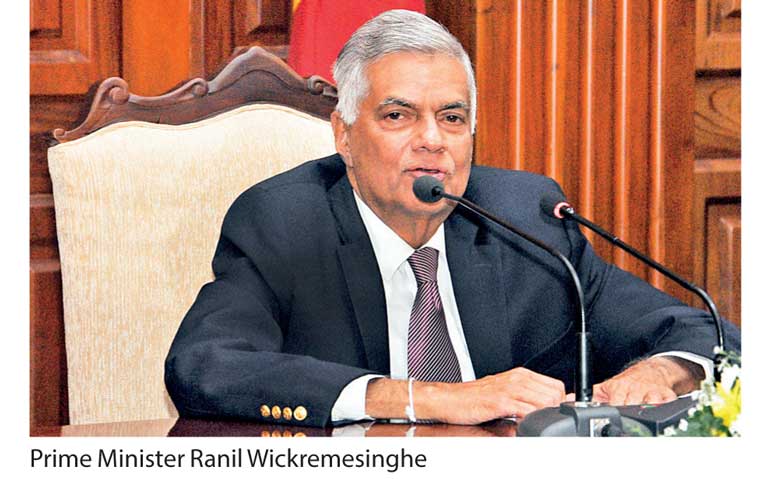Tuesday Feb 17, 2026
Tuesday Feb 17, 2026
Wednesday, 4 April 2018 00:00 - - {{hitsCtrl.values.hits}}

By Skandha Gunasekara and Charumini de Silva
Prime Minister Ranil Wickremesinghe will face a crucial no-confidence motion in Parliament today that could go down to the wire, with some political parties still undecided on their vote at the eleventh hour, while the United National Party (UNP) and its allies are backing their leader to the hilt and are confident they have the necessary numbers to carry the day.
The much anticipated debate on the no-confidence motion is scheduled to be held in Parliament today from 10.00 a.m. to 9.00 pm with a vote expected at the end of the debate. Members of Parliament will cast their votes by standing up and declaring their preference after the electronic system was deemed to be unreliable. Given the likelihood of a heated debate, the public viewing gallery will be closed to students.
On the political front, the United National Front (UNF) party leaders met in the Parliament complex yesterday and resolved to support the Prime Minister in defeating the no-confidence motion. This decision was taken by the UNF leaders following their meeting with the Premier earlier in the day. Overall support by the UNP was echoed by National Policies and Economic Affairs State Minister Dr. Harsha de Silva, who insisted that they had sufficient votes to defeat the no-confidence motion.
“There is no doubt that we will defeat this no-confidence motion against the Prime Minister today. We have the support of the entire 8 January 2015 Movement. All the parties that supported us then have come together with us,” Dr. de Silva said while addressing a news conference at Sirikotha.
He claimed that it was unethical for government ministers to support the no-confidence motion or urge the Premier to step down while being a part of the coalition.
“It is understood that the Opposition wants to topple the Government and come into power. But we are not ready to listen to government ministers with vested interests requesting the Prime Minister to step down. This is not just about the premiership but about the integrity of the Government,” he stressed.
Noting that they were well aware that a few UNP ministers were unhappy voting against the Prime Minister today, Dr. de Silva said the Government would leave no room for the Opposition to disrupt the political stability in the country.
“We have the numbers and we will show the numbers when voting. We have no issues relating to the numbers,” he stressed.
However, during Tuesday’s customary Cabinet meeting, Minister of Transport and Civil Aviation, SLFP Deputy Leader Nimal Siripala de Silva, had called on the Prime Minister to step down from his position before the no-confidence motion was brought up in Parliament.
This was a repetition of the call by the Sri Lanka Freedom Party (SLFP) Parliamentary Group late on Monday for Wickremesinghe to step how. Yet UNP ministers were clear this request would not be heeded by the Prime Minister.
Although Premier Wickremesinghe did not respond to Minister Nimal Siripala de Silva’s remarks, the party leaders and ministers of the UNF disagreed with Minister De Silva’s demand and insisted that the Premier should remain in his post, Minister of Education and UNP Deputy General Secretary Akila Viraj Kariyawasam told the Daily FT.
According to Minister Kariyawasam, President Sirisena, who chaired the Cabinet meeting, had vowed to stay neutral concerning the no-confidence motion, giving this assurance when the latter had met with the UNF ministers Malik Samarawickrama, Mangala Samaraweera, Arjuna Ranatunga and Rajitha Senaratne last morning at the President’s official residence on Paget Road.
Nonetheless, uncertainty remains on how the pro-Sirisena faction of the SLFP will vote.
“There is common consensus in the party to vote in favour of the no-confidence motion,” State Minister Lakshman Yapa Abeywardena had told Reuters.
“Clearly the SLFP is of the view that the Prime Minister should step down.”
State Minister for Finance Eran Wickramaratne said the UNP had asked for a quick vote “to end any uncertainty people will have in their minds” and hoped for a stronger Government to emerge afterwards.
Political instability is weighing on the economy, he said.
“You are not going to get 6-percent-plus kind of growth because of the political issues. We will move into 4-percent-plus in 2018,” he told Reuters.
The yields on Sri Lanka’s benchmark bonds have risen 83 basis points since early this year, and the Central Bank chief has also warned of risks to economic growth from political instability.
Asian Director at consultancy Eurasia Group, Shailesh Kumar, foresaw limited cooperation between the UNP and the SLFP after the no-confidence motion, even if the Prime Minister survived.
“This means there will be limited appetite for economic legislation and instead the two will likely indulge in populism to shore up their positions ahead of the 2020 elections,” he told Reuters.
Local political analysts were also fearful of continued political uncertainty and a deepening crisis within the Coalition Government that would further delay crucial economic, governance and reconciliation reforms the Wickremesinghe-Sirisena duo pledged when they came to power in January 2015.
Minority parties are critical in this scenario, key among them the Tamil National Alliance (TNA) which holds 16 seats in parliament, which said late on Tuesday they would support Wickremesinghe after late night talks with President Maithripala Sirisena. Given the close run in how votes may be divided, the TNA vote could prove crucial. The Sri Lanka Muslim Congress (SLMC), which met with Wickremesinghe this week, is also expected to support the Prime Minister.